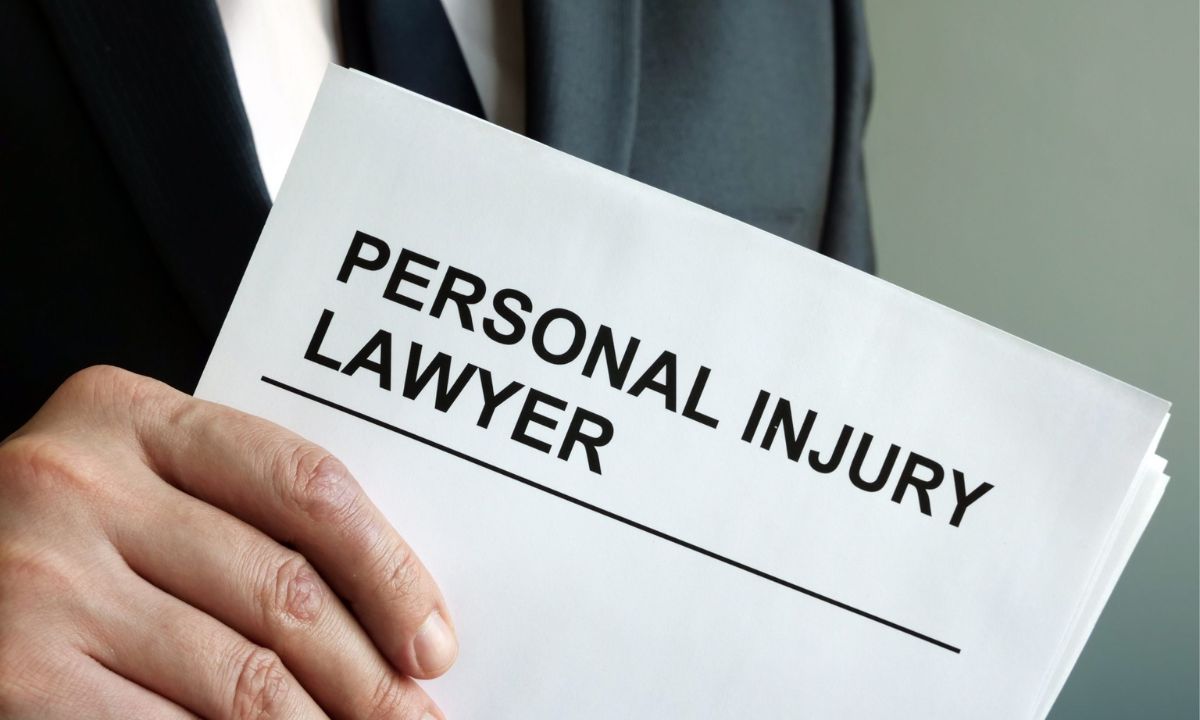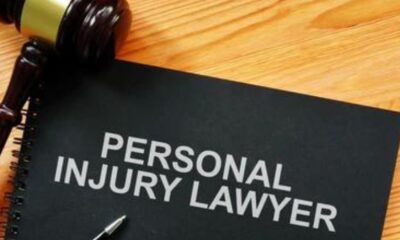LAW
How To Choose The Right Personal Injury Lawyer For Your Case

When dealing with the aftermath of an accident, finding the right personal injury lawyer can make all the difference in your case. A personal injury lawyer will help you understand your rights, guide you through legal procedures, and work to get you the compensation you deserve. If you live in Ottawa, you’ll want a lawyer familiar with Experienced Personal Injury Law Services In Ottawa, particularly if you’re involved in an auto accident. For these situations, LMS Personal Injury is here to help, offering expert legal services with compassion and dedication.
This guide will walk you through the essential steps to help you choose the right personal injury lawyer for your case.
1. Determine Your Legal Needs
Before you start looking for a lawyer, take some time to assess your situation. Not all personal injury cases are the same. Whether you’ve been in a car accident, slipped and fallen, or suffered a workplace injury, different lawyers may specialize in different types of claims.
In Ottawa, if you’ve been involved in a car accident, you’ll want to look for an Ottawa Car Accident Lawyer who has experience in handling these types of cases. The more specific your needs, the better you can narrow down your options to find the right lawyer.
We specialize in a range of personal injury cases, including auto accidents, medical malpractice, and workplace injuries. Knowing that you have a team experienced in your particular issue will bring peace of mind.
2. Look for Experience
Experience plays a key role in how well your lawyer will handle your case. An experienced personal injury lawyer knows how to navigate complex legal systems, assess the true value of your claim, and negotiate with insurance companies.
When researching, consider how long the lawyer has been practising in the field of personal injury law. Look for those who have handled cases similar to yours in the past. For example, We have years of experience helping clients across Ottawa with their personal injury claims. Their extensive background ensures that you’re in capable hands, no matter how complicated your case might be.
3. Check Their Track Record
A lawyer’s success rate is another critical factor to consider. Even if a lawyer has years of experience, you want to know that they have a track record of winning cases or achieving favourable settlements for their clients. Ask about their case history, and don’t be afraid to request information about similar cases they’ve handled.
The lawyers have a solid reputation for securing positive outcomes for their clients. Whether negotiating with insurance companies or representing clients in court, they consistently achieve results.
4. Read Reviews and Testimonials
Client reviews and testimonials offer a glimpse into what you can expect when working with a particular lawyer. Reading about other people’s experiences can give you insight into the lawyer’s professionalism, communication style, and overall effectiveness.
Look for reviews on trusted platforms, such as Google or legal review sites. For instance, We are known for our excellent client service, with many reviews highlighting the firm’s clear communication and dedicated approach to each case.
5. Ask About Fees and Costs
One of the most important aspects of choosing a personal injury lawyer is understanding the fee structure. Most personal injury lawyers work on a contingency fee basis, which means they only get paid if you win your case. This arrangement can be a great advantage, especially if you’re already facing medical bills and other expenses.
Be sure to ask any potential lawyer about their fee structure upfront. Ask if there are any hidden costs, such as court fees or administrative expenses, and how these will be handled if the case doesn’t go in your favour.
We operate on a contingency fee basis, meaning you won’t have to worry about legal fees unless you recover compensation. They are transparent about their pricing, so you’ll always know where you stand financially.
6. Schedule a Consultation
Before you make your final decision, it’s a good idea to schedule an initial consultation with the lawyer. Many personal injury lawyers offer free consultations where you can discuss your case and get a feel for how the lawyer operates.
During this consultation, pay attention to the lawyer’s communication style and responsiveness. Are they actively listening to your concerns? Are they answering your questions clearly and thoroughly? A good lawyer will take the time to explain the process and give you a realistic outlook on your case.
7. Evaluate Their Communication Skills
Communication is crucial when working with a lawyer. You want someone who will keep you updated throughout the process and explain things in a way you can understand. If you find it difficult to get in touch with a lawyer or if they don’t respond promptly to your inquiries, it may be a red flag.
Communication is a priority. Their team is known for being accessible and keeping clients informed every step of the way. They understand that dealing with an injury is stressful, and they work hard to ease your burden by keeping you in the loop.
8. Consider Their Resources
Personal injury cases can sometimes require extensive resources, including expert witnesses, medical professionals, and accident reconstruction specialists. Make sure the lawyer you choose has access to these resources to build a strong case.
We have the resources necessary to gather evidence and strengthen your case. Their team works with top medical professionals and experts to ensure you get the compensation you deserve.
9. Trust Your Instincts
Ultimately, trust your gut when choosing a lawyer. You want someone who not only has the experience and skills but also makes you feel confident in their ability to represent you. If something doesn’t feel right, it’s okay to explore other options.
When you work with a reputable personal injury lawyer, you can trust that you’re in good hands. Their compassionate, client-centered approach ensures that your needs come first. They are committed to fighting for your rights and will go above and beyond to secure the best outcome possible for your case.
10. Local Knowledge Matters
If you’re in Ottawa, it’s essential to find a lawyer who understands Personal Injury Law in Ottawa. Local laws and regulations can have a significant impact on your case, and you want a lawyer who is familiar with the local legal landscape.
As an Top-Rated Ottawa Car Accident Lawyers for Legal Support, LMS Personal Injury has deep knowledge of the legal system in Ottawa and knows how to navigate it effectively to get you the best result. Their local expertise is a major asset when dealing with personal injury claims.
Choosing the right personal injury lawyer is a critical decision that can greatly impact the outcome of your case. By focusing on experience, communication, and track record, and considering local expertise in Personal Injury Law in Ottawa, you can find a lawyer who will fight for your rights and help you get the compensation you deserve. We are here to provide the professional legal representation you need during this challenging time.
ALSO READ: Unpacking the 72 Sold Lawsuit: What You Need to Know
LAW
Unpacking the 72 Sold Lawsuit: What You Need to Know

The real estate industry is no stranger to controversy, but the recent 72 Sold lawsuit has certainly stirred up a whirlwind of attention. As buyers and sellers navigate the complexities of property transactions, this legal battle raises crucial questions about business practices within the sector. What exactly are the allegations against 72 Sold? And how could this impact both customers and investors alike? Dive in as we unpack everything you need to know about the 72 Sold lawsuit and what it might mean for the future of real estate transactions. The outcome could change how people think about selling their homes forever.
The Allegations Against 72 Sold
The allegations against 72 Sold have raised eyebrows and concerns across the real estate industry. Critics claim that the company misrepresents its selling process, leading clients to believe they’re getting a better deal than what’s truly on offer.
Some customers allege deceptive marketing practices. They argue that promises of quick sales and higher prices are often not fulfilled, leaving sellers disillusioned and financially strained. Reports suggest instances where properties sold for less than expected.
Additionally, there are claims surrounding transparency in fees associated with their service. Customers feel blindsided by hidden costs not disclosed upfront. This lack of clarity raises questions about ethical practices within the company.
As more people catch wind of these issues, trust in 72 Sold may continue to wane unless addressed adequately. The unfolding situation highlights a need for greater accountability in real estate transactions moving forward.
Impact on Customers and Investors
The 72 Sold lawsuit has raised significant concerns among customers and investors alike. Buyers who relied on the company’s promises may feel betrayed, as allegations suggest they were misled about the home-selling process.
For homeowners, the implications are troubling. Many trusted 72 Sold to streamline transactions and maximize profit. Now, uncertainty looms over their experiences with the selling platform.
Investors are also watching closely. The negative publicity surrounding this lawsuit can impact stock value and market confidence in similar businesses. A tarnished reputation might deter potential backers from future ventures.
Moreover, trust is a crucial currency in real estate. If clients perceive that their interests were secondary to profits, it could shake their faith not just in 72 Sold but in other companies within the industry too. This ripple effect may lead to increased scrutiny of business practices across the board.
Response from 72 Sold and their Legal Team
72 Sold has been proactive in addressing the lawsuit, emphasizing their commitment to transparency. Their legal team quickly issued a statement affirming that they are prepared to defend against the allegations.
They argue that their business model is sound and compliant with industry standards. The company believes these claims stem from misunderstandings about how they operate.
In addition to this defensive stance, 72 Sold has made it clear that customer satisfaction remains a priority. They have encouraged feedback from clients and stakeholders while working diligently to resolve any concerns raised by the suit.
Behind closed doors, discussions continue as they seek an amicable resolution. As developments unfold, both customers and investors will be closely watching how this situation evolves.
The Future of 72 Sold
The future of 72 Sold remains uncertain in light of the ongoing lawsuit. As the case unfolds, it could significantly reshape the company’s operations and business model.
If they navigate this challenge effectively, there’s potential for growth. Innovation may be necessary to regain customer trust and ensure compliance with industry standards.
Investors will likely keep a close eye on developments. Their confidence hinges on how transparent the company remains during this tumultuous period.
Moreover, consumer sentiment plays a crucial role. A commitment to ethical practices can help rebuild relationships with clients who feel let down by recent events.
Adaptability will be key for 72 Sold moving forward. They must find ways to pivot while addressing concerns raised in the allegations against them.
Lessons Learned for Investors and Customers
The unfolding 72 Sold lawsuit highlights important lessons for both investors and customers. Due diligence is vital. Before committing resources, it’s crucial to research a company thoroughly.
Transparency matters immensely in any business relationship. Investors should demand clear communication regarding operational practices and financial health.
For customers, understanding the terms of service can prevent misunderstandings later on. Always read the fine print before signing agreements or contracts.
Trust your instincts when something feels off. If an offer seems too good to be true, it often warrants further investigation.
Staying informed about industry trends and potential red flags can empower stakeholders to make better decisions moving forward. Awareness is the first step toward safeguarding one’s interests in a fluctuating market like real estate.
Conclusion: What This Means for the Industry as a Whole
The unfolding 72 Sold lawsuit has sent ripples throughout the real estate industry. As allegations surface and customer trust wavers, stakeholders are compelled to reassess their positions. Investors are particularly wary, reflecting on how such legal challenges can impact business viability.
This situation highlights a crucial lesson: transparency is vital in any transaction or service model. For customers, understanding the intricacies of how businesses operate will be essential in making informed decisions moving forward.
As we observe the outcomes from this case, it’s clear that all players within the real estate market need to prioritize integrity and accountability. The implications of this lawsuit extend beyond just one company; they serve as a wake-up call for an entire industry that must adapt to maintain consumer confidence and operational legitimacy.
LAW
Understanding the Kennedy Funding Lawsuit: What You Need to Know

The world of private lending can be a complex arena, filled with opportunities and challenges. Among the key players in this space is Kennedy Funding, a company that has garnered significant attention—not just for its business practices but also due to a controversial lawsuit making waves across the industry. If you’re curious about what led to this legal battle, who’s involved, and what it means for future lenders and borrowers alike, you’re in the right place. Buckle up as we delve into the intricacies of the Kennedy Funding lawsuit and uncover essential insights that could impact your understanding of private finance.
The Controversial Lawsuit Against Kennedy Funding
The lawsuit against Kennedy Funding has sparked significant debate within the financial community. This case has captured attention due to its implications for private lending practices.
At the heart of the controversy are claims that Kennedy Funding engaged in predatory lending. Critics argue that their terms were excessively onerous, trapping borrowers in a cycle of debt.
Supporters of the company counter these allegations, stating that all transactions were conducted transparently and ethically. They emphasize that borrowers had numerous options available to them.
This clash between perspectives raises essential questions about accountability in private lending. As more details emerge, industry stakeholders are closely monitoring how this lawsuit unfolds and its potential repercussions on future practices.
Background of the Lawsuit
The Kennedy Funding lawsuit stems from a series of complex financial dealings and alleged contractual breaches. Founded in 1997, Kennedy Funding specializes in private lending for real estate projects. Over the years, it has gained attention for its aggressive funding strategies.
However, tensions began to rise when certain investors claimed they were misled about the terms of their investments. Allegations surfaced that some agreements lacked transparency, leading to significant disputes.
As the case unfolded, various documents came into play. These included loan agreements and communications between parties involved. The narrative quickly became contentious as both sides presented differing accounts of events.
With public interest escalating, this lawsuit highlighted critical issues within the private lending sector. Many wondered how it would affect not just Kennedy Funding but also other players in an already complicated industry landscape.
Key Players Involved in the Case
The Kennedy Funding lawsuit has drawn considerable attention due to its high-profile players. At the forefront is Kennedy Funding itself, a prominent private lending firm known for providing financing solutions in real estate.
Key figures from the company have been thrust into the spotlight. Their testimonies and actions are scrutinized closely, as they attempt to defend their practices against serious allegations.
On the opposing side stands a coalition of disgruntled borrowers and other stakeholders. These individuals allege misconduct and unfair treatment throughout their dealings with Kennedy Funding.
Legal representatives on both sides are also pivotal in shaping the narrative of this case. Lawyers specializing in finance law bring their expertise to ensure that arguments resonate within legal parameters while engaging public interest.
Each player adds a layer of complexity, making it essential for observers to stay informed about their roles and influence on proceedings.
Allegations and Counterarguments
The Kennedy Funding lawsuit revolves around several serious allegations. Critics claim the company engaged in predatory lending practices. They argue that exorbitant fees and interest rates placed borrowers in precarious financial situations.
On the flip side, Kennedy Funding has firmly denied these accusations. The firm insists it provides essential capital to businesses that traditional lenders overlook. Their supporters highlight the importance of private funding for economic growth.
Another point of contention is transparency in loan agreements. Detractors allege hidden terms mislead borrowers about their commitments. However, Kennedy representatives maintain that all documentation is clear and accessible.
This tug-of-war between claims and defenses underscores a crucial debate within the industry: balancing risk with opportunity remains complex yet vital for both lenders and borrowers alike.
Impact on the Private Lending Industry
The Kennedy Funding lawsuit has sent ripples through the private lending industry. Many lenders are now reassessing their practices and compliance measures. The case underscores the importance of transparency in all transactions.
As scrutiny increases, firms must ensure they adhere to ethical standards. Reputation matters significantly in this sector; a scandal can tarnish trust nearly overnight.
Smaller lenders might feel pressure as larger institutions tighten their policies. A cautious approach could mean fewer loans being issued, leading to a potential slowdown in market activity.
Moreover, legal precedents set by this case may influence future disputes and regulations. Stakeholders will need to stay informed about evolving laws that govern private funding arrangements.
This situation could also encourage greater collaboration within the industry for best practices. Sharing insights on navigating challenges may prevent similar issues from arising again.
Conclusion: Lessons Learned from the Kennedy Funding Lawsuit
The Kennedy Funding lawsuit serves as a significant case study in the realm of private lending. It highlights the complexities and challenges that can arise within this industry. Stakeholders must take heed of the allegations made, which underscore issues such as transparency and ethical practices.
As legal battles unfold, they not only influence the parties involved but also set precedents for how similar cases may be handled in the future. The implications stretch beyond just one company; they affect investors, borrowers, and lenders alike.
For those engaged in private financing or considering entering this field, it’s crucial to understand these dynamics. Awareness of potential pitfalls can help individuals and businesses navigate their own journeys more successfully.
Every controversy brings forth lessons that can lead to improvement. The Kennedy Funding lawsuit is no different; it invites reflection on best practices within an evolving landscape where vigilance is essential for sustainable success.
LAW
Signs You Need a Slum Landlord Attorney to Handle Housing Violations

Living in a rental property should come with the assurance of safety, comfort, and adherence to housing standards. Unfortunately, some landlords neglect their responsibilities, creating unsafe or unhealthy living conditions for tenants. If you find yourself dealing with persistent housing issues and unresponsive landlords, it may be time to seek legal assistance. Experienced lawyers for slumlords can help protect your rights and hold negligent property owners accountable. For expert legal support, visit lawyers for slumlords.
This blog outlines key signs that indicate you may need a slum landlord attorney to address housing violations effectively.
Persistent Health and Safety Hazards
One of the most alarming signs of a negligent landlord is the presence of ongoing health and safety hazards in your rental property. These issues not only compromise your quality of life but can also pose serious risks to your well-being.
- Mold and Mildew: Persistent dampness and mold growth can cause respiratory issues and allergies, especially for children and the elderly.
- Pest Infestations: Rodent or insect infestations are not only unsanitary but can lead to property damage and health problems.
- Structural Hazards: Issues such as broken stairs, unstable balconies, or exposed wiring create unsafe conditions that require immediate attention.
If your landlord fails to address these hazards despite repeated complaints, consulting a slum landlord attorney can help enforce compliance with housing regulations.
Uninhabitable Living Conditions
Landlords are legally obligated to provide habitable living conditions, including functional utilities and safe infrastructure. When these basic necessities are neglected, tenants have the right to seek legal recourse.
- No Heat or Hot Water: Inadequate heating or lack of hot water violates habitability standards, especially during colder months.
- Plumbing and Electrical Failures: Issues like leaking pipes or faulty electrical systems can disrupt daily life and pose serious risks.
- Unaddressed Repairs: Broken windows, damaged locks, or missing smoke detectors compromise both safety and security.
An attorney can help you demand repairs or seek compensation for damages caused by uninhabitable conditions.
Retaliatory Actions by the Landlord
Some landlords retaliate against tenants who report violations or exercise their legal rights. Retaliatory actions are illegal and should not go unchallenged.
- Eviction Threats: If your landlord attempts to evict you after you file a complaint or report a violation, this may constitute retaliation.
- Unjust Rent Increases: Sudden, unreasonable rent hikes following a dispute can be another form of retaliation.
- Harassment or Intimidation: Threatening behavior, constant inspections, or refusal to communicate in good faith are tactics some landlords use to pressure tenants.
In such cases, a slum landlord attorney can intervene to protect you from unfair treatment and uphold your tenant rights.
Ignoring Tenant Complaints
When landlords consistently ignore tenant complaints or fail to respond to repair requests, it’s a clear sign of negligence. Documenting these instances and seeking legal assistance can compel your landlord to take action.
- Repeated Complaints: If you’ve made multiple complaints about the same issue without resolution, it’s time to escalate the matter legally.
- Delayed Responses: Landlords who take weeks or months to address critical issues show a lack of commitment to maintaining the property.
- Refusal to Communicate: Ignoring calls, emails, or letters regarding urgent concerns signals a breakdown in the tenant-landlord relationship.
Legal intervention ensures that your concerns are addressed promptly and appropriately.
Breaches of Lease Agreements
Lease agreements outline the responsibilities of both tenants and landlords. If your landlord violates these terms, it’s important to seek legal advice to protect your rights.
- Failure to Maintain Common Areas: Landlords are responsible for keeping shared spaces, such as hallways and parking lots, clean and safe.
- Unauthorized Entry: Entering your rental unit without proper notice or consent breaches privacy laws and lease terms.
- Withholding Security Deposits: Refusing to return your security deposit without valid reasons is a common lease violation.
An attorney can help you navigate these breaches and pursue legal remedies to enforce your agreement.
Exposure to Legal Risks
In some cases, a landlord’s negligence can expose tenants to legal risks, such as fines or penalties for property-related violations. This is especially concerning when tenants are unaware of the underlying issues.
- Zoning Violations: Renting out properties in non-compliant zones can result in penalties for tenants unaware of the situation.
- Illegal Utility Practices: If utilities are improperly set up or tampered with, tenants may face disruptions or legal consequences.
- Improper Evictions: Evictions carried out without following proper legal procedures are another red flag.
Legal representation can help you navigate these situations and ensure your rights are protected.
Lack of Compliance with Local Housing Laws
Landlords must adhere to local housing codes and regulations to maintain safe and livable rental properties. A failure to meet these standards may warrant legal action.
- Building Code Violations: Issues such as inadequate fire escapes, faulty wiring, or insufficient ventilation often violate housing codes.
- Health Code Breaches: Unsanitary conditions, pest infestations, and lack of clean water are common health code violations.
- Non-Disclosure of Hazards: Landlords are required to disclose known hazards, such as lead paint or asbestos, to tenants.
An attorney specializing in slum landlord cases can help you identify violations and hold your landlord accountable.
Conclusion
Persistent housing violations, neglectful landlords, and unsafe living conditions are all clear signs that you may need legal assistance. A slum landlord attorney can help you enforce your rights, demand necessary repairs, and seek compensation for damages caused by negligence. If you’re facing these challenges, don’t hesitate to reach out to experienced lawyers for slumlords who can guide you through the legal process.
By taking action, you can ensure that your home is a safe and comfortable place to live while holding irresponsible landlords accountable for their obligations.
-

 TECHNOLOGY3 months ago
TECHNOLOGY3 months agoSky Bri Net Worth Revealed: How She Built Her Financial Empire
-

 TECHNOLOGY6 days ago
TECHNOLOGY6 days agoTop 10 Must-Read Stories from Kristen Archives You Can’t Miss
-

 CRYPTO2 weeks ago
CRYPTO2 weeks agoCrypto30x.com Review: Is It the Right Platform for You?
-

 BUSINESS1 week ago
BUSINESS1 week agoTraceLoans Explained What You Need to Know
-

 CRYPTO4 months ago
CRYPTO4 months agoInvest Smart: Leveraging Data and Analysis on 5StarsStocks.com
-

 TOPIC3 days ago
TOPIC3 days agoDiscovering the //Vital-Mag.net Blog: Your Ultimate Source for Lifestyle, Health, and More
-

 TOPIC3 days ago
TOPIC3 days agoExplore the ://Vital-Mag.Net Blog: Where Content Meets Creativity
-

 TOPIC3 months ago
TOPIC3 months agoSailing in Style: Exploring the Make1M.com Luxury Yachts


